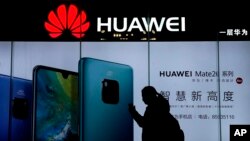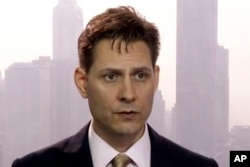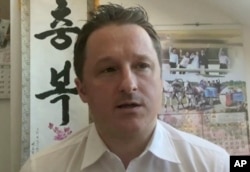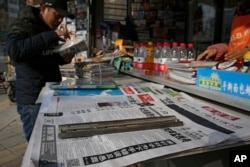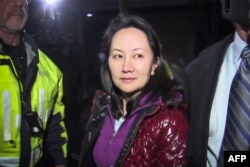China on Monday accused two Canadians of stealing state secrets, days after Canada said it would hold a hearing this week on a U.S. request to extradite a Chinese tech executive accused of violating U.S. trade sanctions against Iran.
In what China called a "major development" in the case, it accused former Canadian diplomat Michael Kovrig, who was detained in December, of gathering and stealing "sensitive information and other intelligence" in China since 2017.
Businessman and entrepreneur Michael Spavor was accused of providing intelligence to Kovrig.
China described Spavor as an "important contact" for Kovrig.
In the past, Spavor has had contacts with high-ranking North Korean officials, including leader Kim Jong Un.
A Chinese statement said, "Kovrig's alleged behavior of gathering and stealing secrets and other intelligence for a foreign power has seriously violated Chinese laws."
Both Canadians were detained shortly after Meng Wanzhou, chief financial officer of China's giant Huawei technology company, was apprehended in Vancouver at the request of the United States.
A Canadian court is holding an extradition hearing on Wednesday. She could be sent to the U.S. to face the Iran sanctions charges, but with appeals of a decision, it may be months before the case is resolved.
The U.S. has been lobbying its allies to shun Huawei products on national security grounds, contending that China requires the company to give the government intelligence it recovers from use of its products, an allegation China rejects.
The arrest of Meng and detention of the two Canadians have strained Chinese-Canadian relations. The tensions heightened in January when in a sudden retrial of drug trafficking charges, a Chinese court sentenced Canadian Robert Lloyd Schellenberg to death, overturning an earlier 15-year prison term.
At the time of his arrest, Kovrig was the northeast Asia senior adviser to the International Crisis Group, which aims to prevent and resolve deadly conflicts. China's official Xinhua news agency said he often entered the country using an ordinary passport and business visas.
The news agency said, "Authorities stressed that China is a country ruled by law and will firmly crack down on criminal acts that severely undermine national security."
It said further judicial proceedings would "take place based on the case's progress."
A spokesman for the International Crisis Group said, "We are aware of the Xinhua report of 4 March but have heard nothing official about any charges being laid against our colleague, Michael Kovrig. Michael's work for Crisis Group has been entirely transparent and in the open, as all who follow his work can attest. Vague and unsubstantiated accusations against him are unwarranted and unfair."
While the charges were announced against Kovrig and Spavor, China's Foreign Ministry urged Canada to "immediately release Ms. Meng Wanzhou and let her return to China in safety while ensuring her legitimate and justifiable rights and interests and not repeat [Canada's] mistakes."
Meanwhile, Meng, the daughter of Huawei's founder, sued the Canadian government, its border security agency and the national police force for rights violations, claiming she was detained, searched and questioned for hours before being told she was under arrest and allowed access to counsel.
She is under house arrest in Canada, living on a property she owns in Vancouver.




